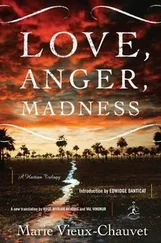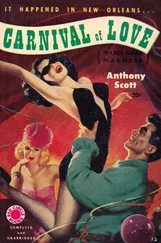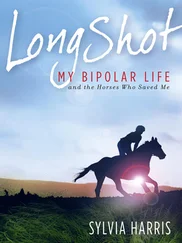Rage swings into a stuporous sleep, and sleep swings into the awful morning sun. My head slides off the edge of the bed, and my mood plummets from shrieking high to muffled low, my heart beating dully on the inside of my ribs. I fall out of bed and stumble down the stairs, heading for coffee, but get too tired on the way and lie down on the living room floor, a painful hole yawning open in my chest. This old, familiar ache does not feel so much like sadness as it does like death, if death is blunt and heavy and topples into you, knocking you flat.
Julian comes in, carrying a cup of coffee. He sees me there on the floor. “Do you want help up?”
I mean to shake my head no, but my face is pressed into the carpet, and it would be too hard to shake it anyway. He picks his way through the wreckage of the night before, clears a chair of debris, and sits down, crossing his legs, an action I find futile and absurd. Slowly, I lift myself up. I’m dizzy—I always am after a rage—and I try to focus my eyes. I look around me at the mess: there’s a jagged-edged half of a wine bottle, a pile of green glass shards nearby. There’s a circular stain of wine on the wall, streams running down as if it leaked blood, and a puddle-shaped stain on the carpet below. There are the remains of a couple of smashed glasses. The bookshelf is cockeyed, leaning precariously on the back of the couch. Books everywhere. The couch has moved across the room from where it’s supposed to be. I peer at what looks like a hole in the wall. I look at Julian.
“Lead crystal clock,” he explains.
I nod, still looking around the room. “This is bad,” I finally say.
“Not good,” he agrees.
“Sorry,” I say.
“It happens,” he says.
“It does,” I say, bewildered. “I don’t know why.”
He leaves—does he even understand what’s happening? I certainly don’t—and I stand barefoot, alone in the mess. I go over to the hole in the wall and stub my toe on the aforementioned lead crystal clock. I pick it up and turn it over in my hands. Wedding present. Ugly. I marvel that it didn’t break. I set it down on the table and look out the window. My shoulders slump.
I shake the fog out of my head. Get a grip, I think. I’m fine. It’s little-boy Julian who’s making me crazy. No one could cope with his dependency, his lack of drive. It’s stressing me out, this game the two of us play, his kicking back, jobless, using my money, embracing the identity of kept man.
No, I correct myself. He’s my savior, companion, the husband, the rock. Our life is normal, balanced. We’re just like everyone else.
I cling to the persona of the good wife, the disciplined writer, the hostess, hanging on with both hands. But even I wear down eventually: the constant fighting, the afternoons crashed out in bed, the sudden spells of ruthless energy—they’re just too much.
I give in. I call for help.
April 1997
I page through the phone book surreptitiously, looking out the window to make sure Julian hasn’t pulled up to the house yet. For some reason, I don’t want him to know I’m calling a psychiatrist. Maybe that would confirm the incredibly obvious. Or maybe he hasn’t noticed that I’ve gone completely nuts. I run my finger down the column and stop at one Richard Beedle, M.D. I like his name. A man named Beedle can’t be all bad.
I sit in the waiting room, paging through an old Time . It’s the same Time they keep in every waiting room. There is only one, and everyone has it, and it is sorely out of date. Bored, I slap it shut and study the painting of flowers on the opposite wall. It looks like every other painting of flowers on every other wall of every office of every psychiatrist, psychologist, nutritionist, behaviorist, et al. that I’ve ever seen.
He calls me into his office. I take my usual place in the usual chair on the usual empty afternoon. I study him the way I always study them. Some of them are mean, some very smart, some idiots, most a little hurried, but some just plain old nice—your usual cross-section of humanity. This Beedle looks to be okay. He has one wandering eye and wears a brown suit. I watch his eye while he settles into his chair. Does he get to see two whole scenes at once? Is one part of him having a conversation with me while another is looking out the window at the new green leaves on the trees?
He mispronounces my name and I correct him, as usual. This is how all psychiatric visits start. He looks friendly enough, so I decide to give him a chance.
“What brings you here today?” he asks.
“I’m going crazy.”
“Well, don’t beat around the bush,” he says. “Jump right in.”
“I’m going nuts. I mean, I am nuts. I’ve always been nuts. They’ve been telling me I have depression for years, but they’re wrong. I used to have an eating disorder. They’re always giving me Prozac. I know, I know, you’ll probably give me Prozac too, which, okay, I understand, you have to give me something, though I should mention that if you had something other than Prozac I would be open to trying it, just so you know. In fact, I’m open to pretty much anything, at this point. I’m kind of desperate.” Weirdly, I laugh. “I mean, kind of really desperate. Not to make a fuss or anything. I don’t want to overstate my case. I don’t want to be malingering. Do you think I’m malingering? Once a nurse told me I was malingering when I told her the Prozac was making me crazy.” I pause. “What exactly is malingering?” I ask.
“It’s when you’re making a big deal out of nothing. Making symptoms seem worse than they are.”
“See?” I say, and throw up my hands. “Exactly. I don’t want to be malingering. I definitely don’t want to make something out of nothing.”
“You’re not malingering.”
“Well, that’s good. But anyway, really, now that I think of it, this really is nothing. It’s not such a big deal. I mean, I’m not crazy crazy. I’m not wandering around with a grocery cart full of newspapers and cans talking to myself. I mean, I talk to myself a little, but not in a crazy way—doesn’t everybody talk to themselves?” He nods. He sits with his hands folded on his desk. He hasn’t written anything on his notepad and appears, oddly, to be listening. I appreciate his attention; it’s very courteous of him. “By the way, oh my gosh,” I say, suddenly flustered, “I’m going on and on. I know you’re busy. I know you must have a million patients. Have I already used up my time?” I ask, a little panicked.
“No.”
“How much time do I have?”
“As much as you want. This is a private practice. I’m not an HMO, so no rush.”
“Well,” I sigh, collapsing back in my chair—I notice I’ve been sitting bolt upright the whole time—“thank goodness.” I take a little breather.
“May I ask you something?”
“Sure,” I say, feeling magnanimous.
“Do you always talk this fast?”
“Yes.”
He nods. “Okay,” he says. “Go on.”
“What was I saying?”
“Feeling crazy, but not crazy crazy.”
“Right,” I say. “So I guess that’s it. Do you mind if I look around?”
“Not at all,” he says, so I get up and go over to his bookcase and read all the titles and look at the framed photos and laugh at the little framed cartoon—a man is lying on a couch, yammering on, and the doctor’s writing TOTALLY NUTS!!! on his little pad—and I go over to the window and hop up on the sill and swing my feet a little, then hop back down and come back and sit in my chair.
“All better?” he asks. I laugh. “Has anyone ever mentioned the word mania to you?”
Читать дальше












